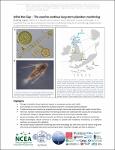mNCEA Policy Brief - Mind the Gap – The need to continue long-term plankton monitoring
| dc.contributor.author | Holland, M | |
| dc.contributor.author | Atkinson, A | |
| dc.contributor.author | Best, M | |
| dc.contributor.author | Bresnan, E | |
| dc.contributor.author | Devlin, M | |
| dc.contributor.author | Johns, D | |
| dc.contributor.author | Machairopoulou, M | |
| dc.contributor.author | Pitois, S | |
| dc.contributor.author | Scott, J | |
| dc.contributor.author | Stern, R | |
| dc.contributor.author | Whyte, C | |
| dc.contributor.author | Widdicombe, C | |
| dc.contributor.author | McQuatters-Gollop, A | |
| dc.contributor.other | Defra | |
| dc.date.accessioned | 2024-03-07T16:17:58Z | |
| dc.date.issued | 2024-03-07 | |
| dc.identifier.citation |
Holland, M. et al. (2024). | |
| dc.identifier.uri | https://pearl.plymouth.ac.uk/handle/10026.1/22151 | |
| dc.description.abstract |
This policy brief argues that while it is beneficial to explore novel plankton survey technology, it is essential that we also continue to maintain traditional long-term monitoring programmes to generate the necessary information to inform policy. Changes in plankton have important implications for the continued provision of ecosystem services, including supporting commercial fish stocks, carbon sequestration, and oxygen production. Such changes can only be detected by studying long-term, consistent plankton datasets which are needed to understand the pressures driving these changes and how we can manage them. Traditional long-term plankton monitoring relies on light microscopy to identify and count plankton taxa, with methods fully supported by national / international QA/QC standards and providing high quality trusted data. Novel technologies, including imaging and molecular methods, offer more efficient means of collecting some types of plankton data, filling targeted knowledge gaps left by traditional monitoring. However, these data are often semi-quantitative, lacking in QA/QC standards, and/or in taxonomic resolution. While these technologies are developed it remains critical to maintain the continuity of traditional plankton monitoring to inform policy assessments of important changes in biodiversity. Losing these time-series, many of which span multiple decades, would impair our ability to detect important change in pelagic habitats, as most changes cannot be detected from short-term data. This would also accelerate the loss of taxonomic expertise, already under threat globally, diminishing our UK skill-base. Novel technologies should be explored in parallel to traditional monitoring, as they can provide complementary data to support policy assessments and research, however, it is important that we do not attempt to replace traditional monitoring with new technology before it has been thoroughly integrated into long-term monitoring programmes. This project was funded by the Department for Environment, Food and Rural Affairs (Defra) as part of the marine arm of the Natural Capital and Ecosystem Assessment (NCEA) programme. The marine NCEA programme is leading the way in supporting Government ambition to integrate natural capital approaches into decision making for the marine environment. Find out more at https://www.gov.uk/government/publications/natural-capital-and-ecosystem-assessment-programme | |
| dc.publisher | University of Plymouth | |
| dc.subject | Defra | |
| dc.subject | mNCEA | |
| dc.subject | natural capital | |
| dc.subject | NCEA | |
| dc.subject | plankton | |
| dc.subject | plankton monitoring | |
| dc.title | mNCEA Policy Brief - Mind the Gap – The need to continue long-term plankton monitoring | |
| dc.type | report | |
| plymouth.confidential | false | |
| dc.identifier.doi | https://doi.org/10.24382/bs9p-6e92 | |
| plymouth.organisational-group | |Plymouth | |
| plymouth.organisational-group | |Plymouth|Faculty of Science and Engineering | |
| plymouth.organisational-group | |Plymouth|Faculty of Science and Engineering|School of Biological and Marine Sciences | |
| plymouth.organisational-group | |Plymouth|REF 2021 Researchers by UoA | |
| plymouth.organisational-group | |Plymouth|Users by role | |
| plymouth.organisational-group | |Plymouth|Users by role|Academics | |
| plymouth.organisational-group | |Plymouth|REF 2021 Researchers by UoA|UoA07 Earth Systems and Environmental Sciences | |
| plymouth.organisational-group | |Plymouth|REF 2029 Researchers by UoA | |
| plymouth.organisational-group | |Plymouth|REF 2029 Researchers by UoA|UoA07 Earth Systems and Environmental Sciences | |
| dc.publisher.place | Plymouth, UK | |
| dc.date.updated | 2024-03-07T16:17:51Z | |
| dc.rights.embargodate | 2024-3-7 | |
| rioxxterms.version | Version of Record |
Files in this item
This item appears in the following Collection(s)
-
PelCap
The Pelagic Natural Capital project -
School of Biological and Marine Sciences


